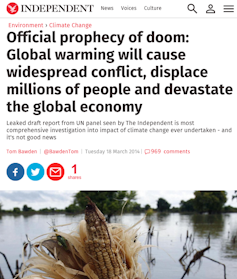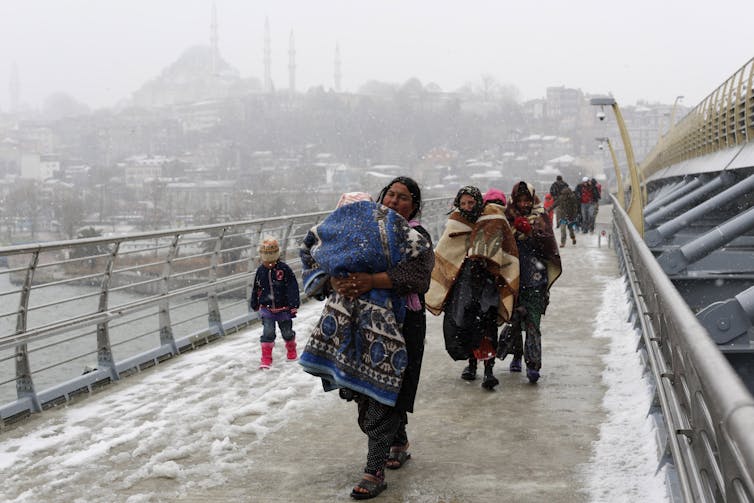Even the best-case scenario following the Paris climate agreement will still lead to rising sea levels, harsher droughts and more destructive storms – all of which will hit those with least protection the hardest. So are we going to see waves of “climate refugees” pushing on affluent countries’ gates? Will hordes of climate change victims jeopardise international security, exacerbating existing crises and spurring armed conflicts?
One would think so, at least judging from the way the media talks about the overlap between climate change and migration. Time after time, again and again, climate refugees are mobilised to provide dangerous global warming with a human face.
Usually this is to highlight the security implications of climate change. Recently, this narrative has surfaced in relation to the Syrian tragedy and the way that the conflict and the related displacements have been attributed to climate change by research papers – and even Prince Charles.
Such alarmism might be appealing, but it’s at odds with most of the research on how climate change will interact with migration.
Against alarmism
The figures of hundreds of millions of climate refugees have been widely echoed in the media but the headline numbers are at the least controversial if not outright scientifically unsound. In any case, the entire concept of “climate refugees” is evocative but misleading.
Let’s begin with the obvious: people migrate for lots of different reasons and, in most cases, it is impossible to single out environmental degradation. When people do move in response to a sudden storm or flooding, they usually stay in the same region and return home as soon as they can. A growing number of interventions point out that migration, in presence of the right conditions, can also represent a proactive strategy to cope with stress or adapt to change.

Finally, there’s no simple link between climate change, displacement and security. Environmental stress can exacerbate tensions, but also increase cooperation. And we should not conflate things playing out at different scales: the idea that food stress (and the poor) cause war is very problematic – a quarrel over a loaf of bread is not the same as an armed conflict between states.
None of this means the issue is unimportant. Climate change will have the biggest impact on the weakest and most exposed – whether they are migrants or those without the means to move. Indeed, (im)mobility will be one of the currencies through which vulnerable people will pay the price of the international community’s failure to avoid climate change.
Should climate policy deal with migration?
The Paris agreement establishes a “task force” to “develop recommendations” on displacement. Some hoped for stronger wording – an earlier draft included the creation of a “coordination facility”, presumably with more powers. This was only removed in the last days of the summit. Yet in order to keep the issue on the table, a mention in the treaty is a step in the right direction.
However, I am not sure we can expect too much from the UN’s climate process. An emissions deal was clearly the highest priority for this phase of diplomacy. With a “refugee crisis” shaking European institutions and the reaction to the terror attacks in Paris adding to the international tension over migration, the topic was just too controversial. In this context, it wasn’t exactly realistic to expect states in Paris to accept any legally-binding obligations to facilitate the movement of vulnerable people.
But, on top of the question of political feasibility, it is also worth asking whether UN climate policy should even be addressing migration at all.

Migration isn’t a problem to be solved
Environmental discourse has always been haunted by a fear of dangerous, unruly populations in the “global south” – a spectre that arguably still lingers in climate politics. This leads to apocalyptic talk, usually with a strong racial undercurrent, of hordes of refugees threatening “our” security. Not exactly a good starting point.
The idea we should “solve” climate migration is rooted in a view of mobility as pathological, as the result of a failure to develop, to adapt to climate change, or to be more resilient. But in reality, migration is an ordinary social, economic, and political process. It’s neither inherently good nor bad.
Of course, it would be naive to overlook the divisive questions that migration brings to the surface. And we should always remember that people on the move (or stuck somewhere they don’t want to be) can suffer and are often exposed to many wrongs.
Relying on the UN’s climate governance machinery to sort these matters out only obfuscates their inherently political character and will lead to poor policies. To make a provocative comparison: would we ever expect the UNFCCC to “solve poverty”?
Yes, it is important that migration was mentioned in the Paris agreement. And we should talk more about it in the climate change arena. But more as a matter of climate justice than one of security. And not as a contingent problem to be solved (or that can be solved) – rather as one of the ways in which we deal with the highly political question of the kind of mobility and society we want for the decades to come.

